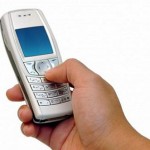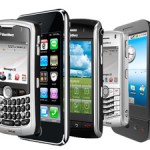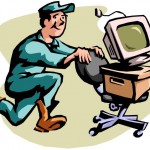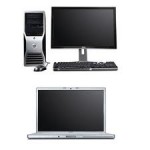7 KEY PASSWORD RULES
How often do you change your passwords?
![]() More than likely, you are using a number of different passwords to access your e-mail account, bank accounts, financial institutions as well as sites like Amazon, ebay, etc. The security of your sites is predicated on the strength of your passwords as well as your ability to keep them private. Here are some simple rules to follow:
More than likely, you are using a number of different passwords to access your e-mail account, bank accounts, financial institutions as well as sites like Amazon, ebay, etc. The security of your sites is predicated on the strength of your passwords as well as your ability to keep them private. Here are some simple rules to follow:
1. All passwords should be changed at least every 6 months
2. Never use names of family members, birthdays, anniversaries, or any other easily “guessed” passwords.
3. Do not use the same password for all your sites
4. While it is critical not to divulge any personal information requested in an e-mail (including your bank), it is especially important not to give out password information and respond to requests to change passwords.
5. When creating a password, it is best to use a combination of numbers, letters and symbols. Again, do not use the same password for all your accounts.
6. Do not list your passwords on a document that is stored in your computer or smartphone. Your files in your computer can easily be accessed by anyone using your computer, particularly if it is part of a network.
7. And finally, be careful whom you share password information with.
If you have any questions about passwords or any other technology issue, you can contact me at 917 921-4518 or by email at jblue@bluetutor.com.
SUMMER’S OVER, TIME TO REASSESS YOUR TECHNOLOGY NEEDS
The world of technology changes constantly. Quite a bit has happened during the past few months, and now that the summer is over, here are some important things to consider to make sure your technology supports your needs:
1. When’s the last time your computer had a checkup? Is it running slowly? Is your anti-virus program up to date?
2. Are you considering an upgrade? Are you undecided on what type of computer to purchase – Windows or MAC? Should you be considering a tablet (iPad, etc.)?
3. Is your cell phone eligible for an upgrade? Do you have a smartphone (blackberry, iphone, android) for the road? Are you sure you are using the best provider (Verizon, AT&T, Sprint, etc.) for your needs?
If you have any questions about these or any other technology issues, you can contact me at 917 921-4518 or by e-mail at jblue@bluetutor.com.
If you have not already done so, you may download a copy of my FREE white paper on technology tips for setting up a home office and operating in the mobile world by clicking HERE or by going to my website at www.bluetutor.com
BACK TO SCHOOL TECHNOLOGY TIPS
 Is your child or grandchild off to college for the first time? If they are returning to school and into an off campus apartment, it is important to address their technology needs. No longer is it just textbooks, clothing and bank accounts on your to-do list. With technology imbedded in both their personal and educational lives, there are a number is issues that must be addressed, hopefully before move-in time. The following are some of the more important things that should be included on your to-do list.
Is your child or grandchild off to college for the first time? If they are returning to school and into an off campus apartment, it is important to address their technology needs. No longer is it just textbooks, clothing and bank accounts on your to-do list. With technology imbedded in both their personal and educational lives, there are a number is issues that must be addressed, hopefully before move-in time. The following are some of the more important things that should be included on your to-do list.
– Most colleges have removed phones from dorm rooms. Your student probably already has a cell phone. However, you must make sure the provider you are using (Verizon, AT&T, Sprint, etc.) has a strong signal at school. Call the school and, if possible, talk to some other students about their experience.
– Check your cell telephone plan. If your student is not going to be in your local area, make sure you have a nationwide plan. In addition, check your usage. More than likely, your usage will increase since you will be speaking with your child more than you think.
– Check your text messaging plan. Most students rely heavily on text messaging which is a simple way of communicating.
– Find out what type of Internet plan the school provides. Does the dorm offer wi-fi connectivity? How about the rest of the campus?
– Most students bring a laptop to school with them. MACs are more popular than Windows based computers. If you need to buy one, most schools have discount plans with different manufacturers. Apple has a student discount plan. Schools offer substantial discounts on most software.
– Are you a Skype user? Being able to video chat makes both students and family members still feel connected. If you and your student both have MACs, you can use iChat. Skype and iChat are similar. However iChat only works if you both have a MAC. Both services are free from any part of the world, as long as you are both on a computer.
– For those students living in off campus apartments, make sure they contact the local cable company to install a modem/router along with their TV service. No need to spend money on installing a land line. A cell phone is sufficient.
Finally, don’t forget the cables. Although the school might have wi-fi, bring along an ethernet cable as well as extension cords. I suggest that everyone have at least two cell phone chargers; one for the room and another to carry with them, since the newer smartphones have limited battery life.
As a parent that has gone through this process of number of times, do not hesitate to contact me if you have any questions regarding either your students’ or your back-to-school needs. I can be reached either by e-mail at jblue@bluetutor.com or by phone at 917 921-4518.
DO YOU CARRY YOUR CELL PHONE WITH YOU?
10 Reasons to keep it close by
 Although cell phone use in the US is well over 90%, there are still individuals that have resisted the urge to “become wired.” Although many of us would like the ability to escape and not be reached, there are many reasons why having a cell phone has become a necessity. The following are some of the more important ones:
Although cell phone use in the US is well over 90%, there are still individuals that have resisted the urge to “become wired.” Although many of us would like the ability to escape and not be reached, there are many reasons why having a cell phone has become a necessity. The following are some of the more important ones:
1. You are almost always accessible. It is possible to limit your accessibility by switching the phone to a vibrate only mode, or turning it off, when at the movies or at dinner for example.
2. In case of emergency, you can reach out for help whether you are lost, have a flat tire or in need of medical assistance.
3. Running late? You can either call or send a text message.
4. Keeping in contact with your children whether it be a change of plans or out late at night.
5. If you are a senior, the ability to keep in touch with your family. If you are living alone, giving your children peace of mind.
6. Cost – Long distance calling is usually cheaper.
7. Taking a trip? – Have your home calls transferred to your cell phone.
8. If you are dependent on e-mail, you can purchase a “smartphone” that permits you to access your messages from anywhere.
9. An easy way of having access to all your contact information.
10. An extra alarm clock.
If you need assistance determining what type of cell phone is best for you or want to discuss upgrade options, do not hesitate to contact me at 917 921-4518 or by e-mail at jblue@bluetutor.com.
10 REASONS TO LOVE NETFLIX!
Do You like Movies?
 1. One monthly fee ($7.99) lets you watch as many movies as you want.
1. One monthly fee ($7.99) lets you watch as many movies as you want.
2. Movies on Demand – You can watch a movie anytime you want either on your TV, computer, or smartphone (iphone, android, etc.)
3. No need to leave home.
4. No late fees
5. Large selection of movies in multiple categories Including classics that you may have missed or want to see again
6. A large library of past TV shows. You can watch multiple episodes of a series in a row
7. Cheaper than subscribing to all the premium movie channels from your cable provider
8. Can’t sleep, watch a movie.
9. You can search for a movie or TV show by category, title, or actor/actress.
10. No Commercials
If you have any questions about how to set up a Netflix account, do not hesitate to contact me by phone at (917) 921-4518 or by e-mail at jblue@bluetutor.com.
In addition, click HERE to join my mailing list and receive my FREE whitepaper on setting up a home office and becoming a true road warrior.
ARE YOU USING SOCIAL MEDIA TO PROMOTE YOUR BUSINESS?
7 Questions You Should Be Asking Yourself
![]() 1. Are you using social media for both personal and business purposes?
1. Are you using social media for both personal and business purposes?
2. Do you have a social media strategy for your business?
2. Have you integrated social media into your marketing plan?
3. If you are one of the 700 million plus Facebook users, have you set up a separate business page?
4. What sites are you using: Facebook, LinkedIn, Twitter, YouTube, Tumblr, Foursqure, etc.?
5. Are you interacting with your contacts and groups on a regular basis?
6. Are you using sites such as Google Analytics to evaluate your social media strategy?
7. Are you able to manage your social media program or do you need to hire a “cyber ghost assistant” in order to devote time to running your business?
Remember, a successful social media program is one that has been customized to fit your specific needs. Make sure your goals are clear before jumping into the social media waters.
If you would like to discuss how to set up a social media plan, do not hesitate to contact me by phone at (917) 921-4518 or by e-mail at jblue@bluetutor.com.
In addition, click HERE to join my mailing list and receive my FREE whitepaper on setting up a home office and becoming a true road warrior.
WHY YOU NEED MORE THAN ONE E-MAIL ADDRESS
Finding it hard to sort through all the Junk?
Do you have only one e-mail address? Chances are, that if you do, you are having a difficult time sorting through it all to find that one important message you have been waiting for. Whether you are using gmail, yahoo, one of the services provided by your cable or DSL provider, or even AOL, your inbox is flooded with ads, jokes and other useless pieces of mail. By most accounts, 90% of all e-mails sent are spam!!
Advertisers love to send notices of sales since it is basically a postage free way of reaching millions of potential customers. Ever notice that a single order from any major retailer that manages to obtain your e-mail address will produce a flood of e-mails, daily or weekly? While most e-mail providers claim to have spam control, only the most obvious spam gets caught. Most retail promotions are not blocked unless you set up blockers manually.
What’s the solution? Well, having at least 2 separate e-mail accounts is a start. If you are running a business, you should have separate accounts for your business and personal lives. Even without a business, you should consider 2 personal accounts.
Why? Consider the number of online sites that you have registered with. Whether it be sites like Amazon, Ebay, The Food Network, Bloomingdales, the New York Times, Fandango (movies), etc., you have open the flood gates. Registering requires an e-mail address which often automatically adds you to their mailing list (unless you opt-out).
I have a separate e-mail address for all sites that I purchase from and/or require an e-mail for registration. My main e-mail address is used for business purposes only, and although I still receive a fair amount of junk, it is much more manageable since I never use this account to register for anything unless it is business related.
While you will never be able to eliminate all the junk and spam, it will at least be much more manageable with separate accounts.
If you have any questions about how to set up secondary e-mail accounts, do not hesitate to contact me by phone at (917) 921-4518 or by e-mail at jblue@bluetutor.com.
In addition, click HERE to join my mailing list and receive my FREE whitepaper on setting up a home office and becoming a true road warrior.
CONFUSED BY YOUR CELL PHONE BILL?
What is a Tiered Data Plan?
 Recently released statistics (as reported by CNN.com) indicate that more than a third of U.S. adults now own smartphones. The Nielsen Company reports that smartphones represent over 50% of all new cell phone purchases.
Recently released statistics (as reported by CNN.com) indicate that more than a third of U.S. adults now own smartphones. The Nielsen Company reports that smartphones represent over 50% of all new cell phone purchases.
By definition, a smartphone is any mobile device that combines functions such as telephone, e-mail, Internet access, contact information, and calendar. The three major suppliers of smartphones are Apple’s I-Phone, RIM’s Blackberry, and Google’s Android.
Cell phone providers (Verizon, AT&T, Sprint, etc.) offer a variety of telephone plans based on your usage. While the telephone plans are the same for smartphones, there is an additional charge for “data,” meaning e-mail and Internet access. These charges add an additional $30 and up to your bill.
Several weeks ago, following the lead of its competitors, Verizon ended its “unlimited” data plan and introduced “tiered” pricing. The end of the unlimited era has confused many consumers who do not understand the new pricing structure which is based on the amount of data usage. Verizon now offers monthly plans of $30 for 2GB of data, $50 for 5GB of data and $80 for 10GB of data. Additional fees will apply if you exceed the limits of your plan.
In order to determine what plan is best for you, below is a list of functions that will impact your data usage.
1. Streaming video – Watching video on programs such as YouTube or full length movies on services like Netflix and Hulu on your smartphone or I-Pad.
2. Streaming Audio – While it is OK to play music from your I-Tunes library, using Internet Radio programs such as Pandora eats into your usage (although not as much as video).
3. Navigation systems – Using your smartphone on the road as opposed to an in-car navigation system.
4. Internet Use – Sites with significant amounts of data.
Accessing social media sites such as Facebook will not consume a lot of megabytes. However uploading photos will. Twitter is fine since it deals mainly with small amounts of text. No need to worry about e-mail, since it is basically plain text. However, if you receive attachments with high resolution pictures, your usage will increase.
An alternative to using your cell phone provider’s data service is using Wi-fi wherever it is available, whether that be at home, in your office or a “hotspot.” There are no data limitations with a wi-fi connection.
As for me, I am on the road quite a bit and use my smartphone all day. An analysis of my usage indicates that I am well under 2GB per month, which should be more than sufficient for the average mobile warrior. I suggest you check with your service provider who is able to provide you with an analysis of your usage prior to selecting a pricing package.
If you have any questions about your cell phone situation, want to discuss a possible upgrade, or any other technology issues, give me a call at 917 921-4518 or send an email to jblue@bluetutor.com.
Click HERE to join my mailing list and receive my FREE whitepaper on setting up a home office and becoming a true road warrior.
MOVING YOUR OFFICE TO YOUR HOME?
Need to Reduce Your Expenses?
What You Need to Know About Your Technology
 The economy has forced many small businesses to cut expenses. Although you might have already reduced your payroll costs and slashed your advertising budget, your overhead is still way too high. The toughest decision has been made to relocate your office to your home and the process is underway.
The economy has forced many small businesses to cut expenses. Although you might have already reduced your payroll costs and slashed your advertising budget, your overhead is still way too high. The toughest decision has been made to relocate your office to your home and the process is underway.
Chances are that you have started to weed through old paperwork that is no longer needed, posted ads on Craig’s list to sell some furniture, called a mover, researched storage facilities, and tried to figure out how fitting your business into your apartment or house will work.
What about your technology needs? Have you given any thought to what you will need and whether or not your home will accommodate your business needs. The following are some issues that must be addressed before you make the move:
1. What are your computer and hardware needs at home?
2. Have you determined whether your home will support the extra electrical load?
3. What about Internet access? Chances are you are using a business Internet provider. Your home Internet provider (Cable or DSL) might have to be upgraded to support your business needs.
4. Have you thought about your communication needs? Will you be transferring your existing business telephone and fax numbers? What if your home is in another state? Perhaps you should consider one of the Internet based phone systems.
If you have any questions about the big move or any other technology issues, you can contact me at 917 921-4518 or by e-mail at jblue@bluetutor.com.
Click HERE to join my mailing list and receive a FREE copy of my whitepaper on Technology Tips for Your New Business.
DO YOU HAVE YOUR OWN COMPUTER FOR YOUR BUSINESS?
 Most likely, your household has a computer or two that is used by everyone. That’s fine for personal use. However, if you have a home office, you need your own computer. You don’t want to be in the middle of answering your e-mails or writing a proposal when another member of the household suddenly interrupts you because they need to look up a movie schedule or do homework.
Most likely, your household has a computer or two that is used by everyone. That’s fine for personal use. However, if you have a home office, you need your own computer. You don’t want to be in the middle of answering your e-mails or writing a proposal when another member of the household suddenly interrupts you because they need to look up a movie schedule or do homework.
Before I discuss your options, let me state that buying a new computer is not the budget breaking experience it was in the past. Prices are well under $1,000 for a state-of -the-art Windows computer while MACs will run slightly higher, based on your needs.
There are two types of computers; desktops which have a box and a separate monitor (there are a number of all-in-one models available), and laptops. Desktop monitors vary in size and can be as large as some TV screens. They are meant to be used in one location.
There are different types of laptops. Their advantage is that they are space savers and, except for the larger models, mobile. The largest, usually weighing over 7 pounds, have monitors as large as 17 inches and are considered “desktop replacements.” They are not meant for mobile use.
The most favored group of laptops weigh under 5 pounds, with screen sizes in the 13”-15” range. These mid-size models are not only space savers, but you can travel with them. They are large enough to use as your main computer, saving on having to buy a second computer for the road.
The third type of laptop is called a netbook. It weighs under 3 pounds with a 10” screens. The keys are small, and are meant for people who need a full function computer for travel purposes only.
Tablets are in the news and growing in importance. Everyone seems to want an iPad, and it has been dominating the tablet market. As we look at it from a business perspective, it can be a useful tool for roaming around your home and on the road with Internet access either through Verizon or ATT or a wherever a wireless network is available. Its features include the ability to use the Internet for e-mail, access your music, contacts and calendar information. However, despite Apple’s claims, it has not replaced the computer, since typing documents on a touch screen is a challenge. Additionally, printing is an issue, and it does not come with any input devices such as a USB port although adapters are available.
The decision concerning what to purchase will be based on the nature of your business and whether you will be operating mainly in your office or on the road. The specifications of the computer (speed, hard drive size, etc.) will not be the determining factor in your decision, since they all have the capacity to address your individual needs.
All types of computers listed above come with a variety of specifications that can be quite confusing. However, if you are concerned about cost, as we all are, there is no need to have the “latest and greatest.”
Speed is overrated. The difference in either buying a computer with the fastest chip or one that is a step lower can be hundreds of dollars, and you will never notice the difference. The fastest and most popular chips are Intel’s i3, i5, and i7 models. However, computers with chips from AMD are less costly and are fine unless you require a high performing model.
Memory (RAM) is probably the most important and least expensive component. At least 3 gigabytes (GB) and, ideally, 4 GB is recommended. Windows computers should be “64 bit” for maximum performance.
As for Hard disk space, 350 GB should be the minimum, although 250 is OK. 500GB is an option for large file storage. Check the prices.
All computers come with USB ports to attach printers and other external devices. The standard is USB 2.0. However USB 3.0 is entering the market although, at this writing, there are few external devices that are able to operate at a faster speed.
Most laptops come with a built in camera for video conferencing but check before purchasing. If you are buying a separate monitor either for a desktop or to use with your laptop at home, make sure it comes with the camera. If your existing monitor does not include a camera, you can purchase one for under $100 that attaches to the top of the monitor.
The issue of Windows vs. MAC always comes up, and there is no clear answer. Windows based computers still represent close to 90% of all computers in the market. Large corporations still depend on them since most major business applications (programs) are written for Microsoft Windows. MACs are very popular for personal use, and many small business owners own them. MAC desktops and laptops are more expensive. However, as of yet, they are not prone to viruses and other malicious attacks and are regarded as easier to use. I own both, a Windows for my business and a MAC for personal use. MACs can run Windows at an extra cost if you need a Windows based program. However, if you include Windows on your MAC, you will need the standard anti-virus and spyware protection as discussed earlier.
If you have any questions about selecting a computer or any other technology issues, you can contact me at 917 921-4518 or by e-mail at jblue@bluetutor.com.
Click HERE to join my mailing list and receive a FREE copy of my whitepaper on Technology Tips for Your New Business.
